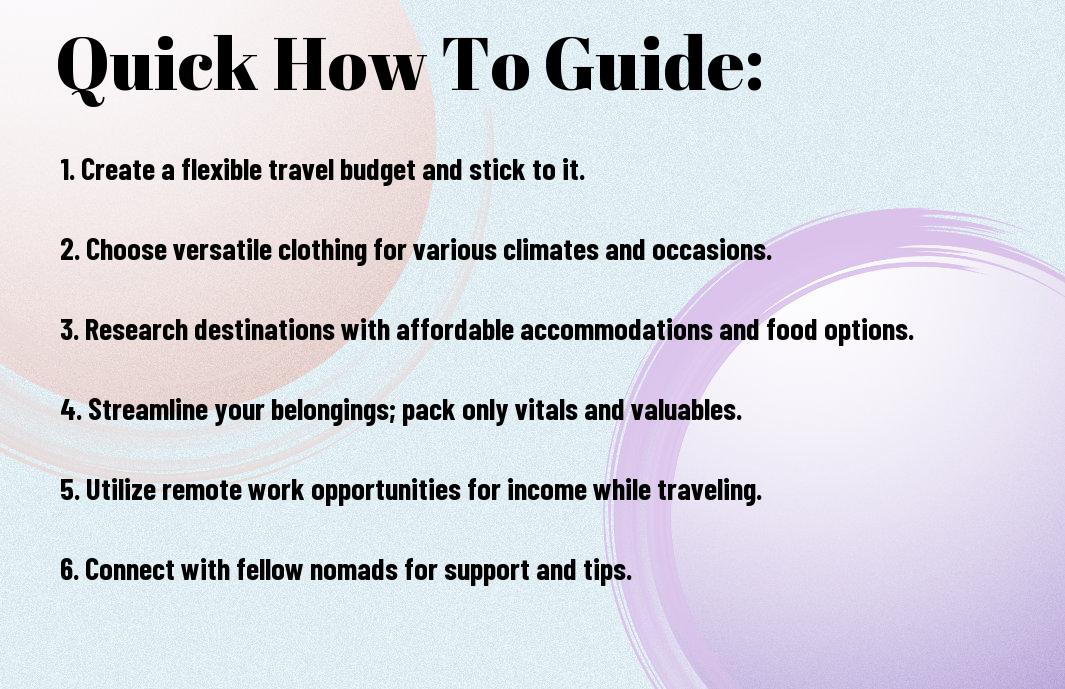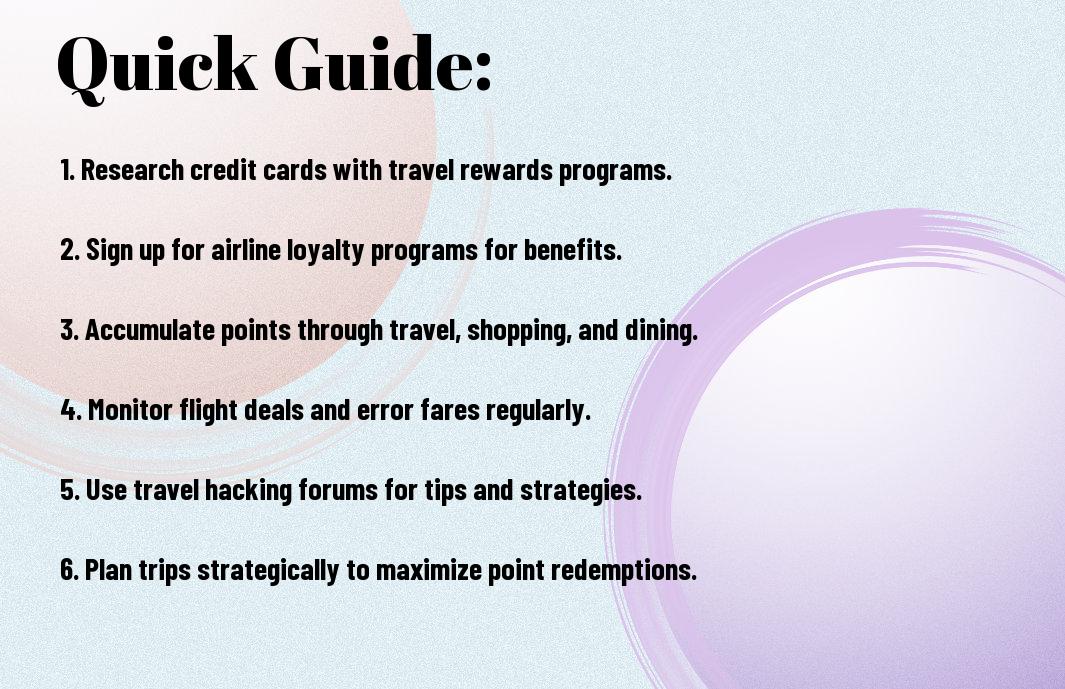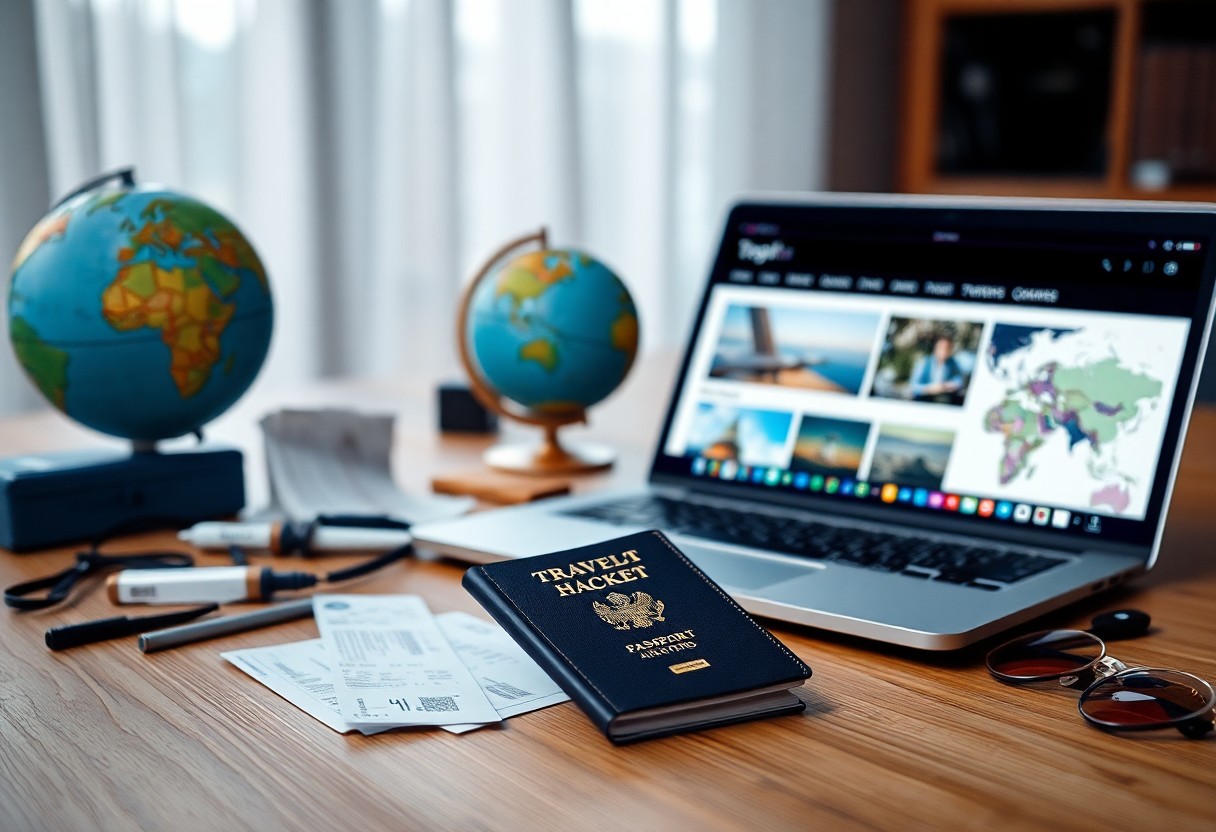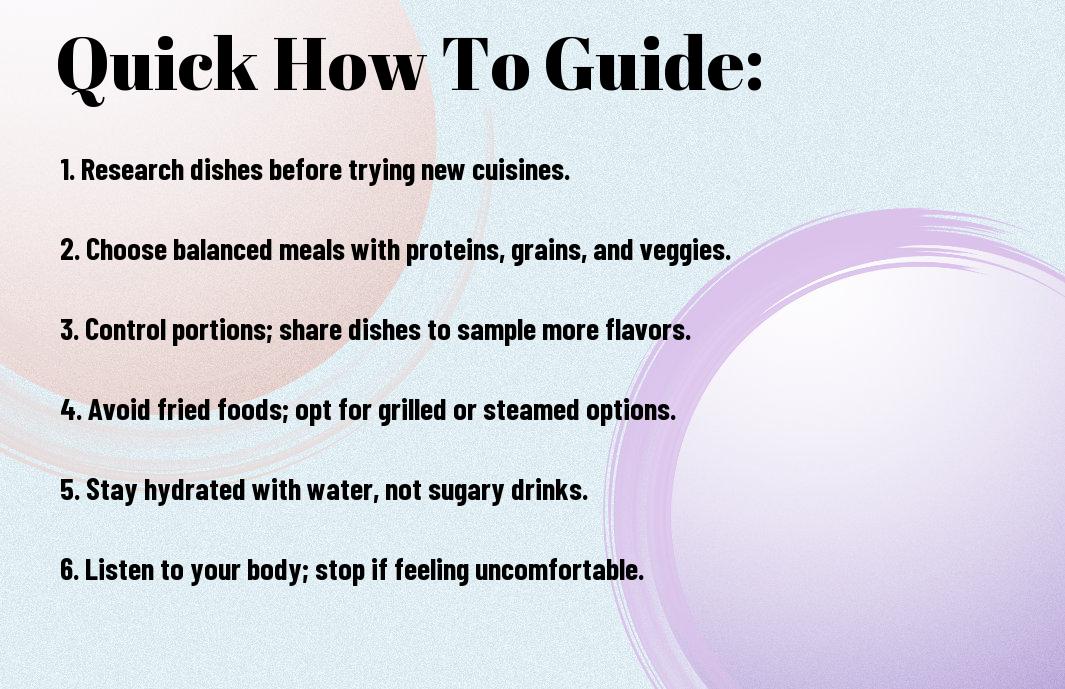Emergencies can disrupt even the most meticulously planned trips abroad, leaving you feeling overwhelmed and uncertain. Knowing how to navigate these situations effectively is crucial for your safety and peace of mind. In this guide, you will learn practical strategies for managing various international travel emergencies, from medical issues to lost documentation. By being prepared and informed, you can tackle challenges head-on and ensure a smoother journey, no matter where you are in the world.
Key Takeaways:
- Stay informed: Keep updated with travel advisories and local news for your destination to anticipate potential issues.
- Emergency contacts: Have a list of important contacts, including your country’s embassy and local emergency services, handy at all times.
- Travel insurance: Invest in comprehensive travel insurance that covers medical emergencies, trip cancellations, and lost belongings.
- Health preparedness: Carry necessary medications and understand local healthcare options to address health emergencies effectively.
- Communication tools: Use reliable communication methods, such as international roaming or local SIM cards, to stay connected with family and authorities.
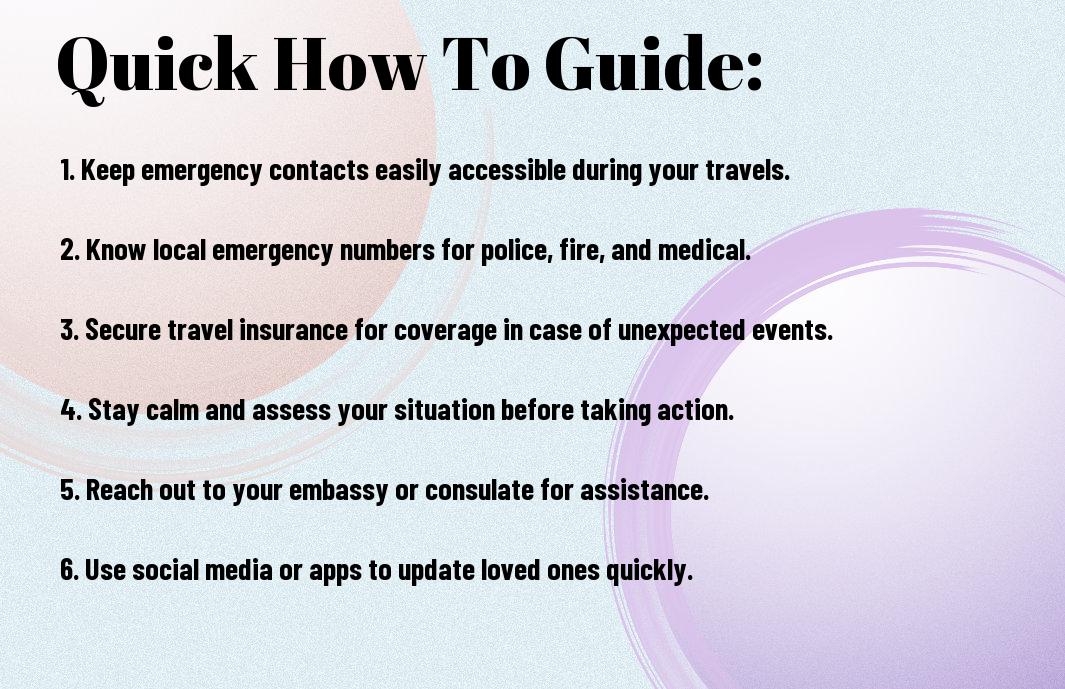
Understanding Travel Emergencies
For any traveler, understanding travel emergencies is vital to ensure a safe and enjoyable trip. Emergencies can arise unexpectedly, ranging from health issues to natural disasters, and knowing how to react can make a significant difference in the outcome. By having a plan and being prepared, you can navigate these challenging situations with greater confidence and composure.
Common Types of International Travel Emergencies
Common travel emergencies can disrupt your journey and impact your safety. Here are some prevalent issues you might encounter:
- Medical emergencies
- Lost or stolen travel documents
- Natural disasters (earthquakes, floods)
- Political unrest
- Transportation disruptions
The awareness of these situations allows you to prepare and respond effectively when the need arises.
| Travel Emergency Type | Potential Impact |
| Medical Emergency | Hospitalization or treatment required |
| Lost Documents | Travel delays and legal issues |
| Natural Disasters | Evacuation and safety risks |
| Political Unrest | Safety concerns and travel advisories |
Key Factors to Consider in Emergencies
One of the most important aspects to consider during emergencies is prompt decision-making. Assess your surroundings, gather relevant information, and consider your options carefully. Taking these steps can help mitigate risks and provide clarity in stressful situations.
- Stay calm and composed
- Evaluate the situation thoroughly
- Reach out for local assistance
- Keenly understand your resources
Thou must also stay informed about the local laws and emergency protocols before traveling. Familiarize yourself with emergency contact numbers and local embassy information. It’s important to know the location of the nearest hospital or clinic should a health issue arise. Being well-prepared allows you to act swiftly and effectively during any emergency.
- Keep emergency contacts handy
- Know the local language basics
- Stay aware of your environment
- Have a basic first-aid kit accessible
The preparation and knowledge you possess can significantly impact your ability to respond successfully when faced with unexpected challenges during your travels.
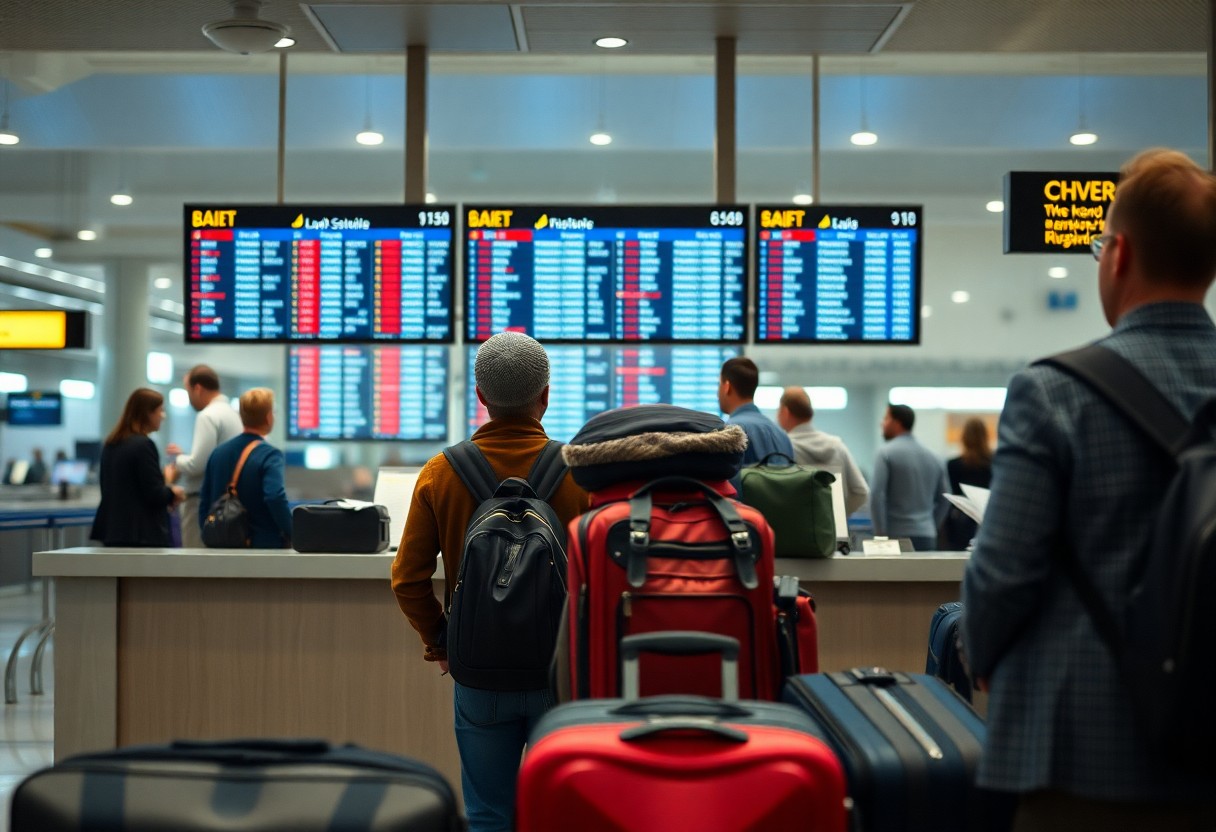
How to Prepare Before You Travel
The best way to ensure you’re equipped to handle international travel emergencies is to prepare thoroughly before you leave. Start by gathering all necessary documents, securing reliable insurance, and familiarizing yourself with local customs and emergency protocols of your destination. Being proactive in your planning can make a significant difference should an unexpected situation arise on your trip.
Essential Documentation and Information
The foundation of your travel preparedness lies in your documentation. Carry multiple copies of important documents such as your passport, visa, travel insurance, and emergency contacts. Store a digital backup on your phone or in cloud storage for easy access if originals are lost or compromised.
Tips for Emergency Contacts and Communication
If an emergency occurs while you’re traveling, having a plan for communication is vital. Keep a list of important contacts, including family, friends, your country’s embassy, and local emergency services. Familiarize yourself with how to use your phone abroad and consider purchasing a local SIM card or an international plan for better connectivity. Here are some helpful tips:
- Save important numbers in your phone and write them down.
- Share your itinerary with someone you trust back home.
- Enable location sharing with a trusted contact.
Knowing who to contact and how to reach them can ease your mind in times of crisis.
Information about emergency contacts should be comprehensive and accessible. In addition to saving important phone numbers, you should also have a clear understanding of the communication resources available to you at your destination. Consider downloading relevant apps, like those for translation or local emergency services, beforehand. Here are some practices to follow:
- Verify that your devices are charged and capable of international use.
- Familiarize yourself with local emergency numbers, as they can differ from your home country.
- Ensure that your family and friends know how to reach you overseas.
Knowing how to communicate effectively can make navigating emergencies more manageable and less stressful.
Immediate Actions During an Emergency
Many travelers face unexpected situations while abroad, and it’s important to act swiftly. Begin by staying calm and focused, as this will help you think clearly and make sound decisions. Contact local authorities if necessary, and ensure your safety before taking further steps. Assess the situation and reach out to your travel insurance provider to understand your coverage and available resources. Staying alert and informed will guide your actions and help you regain control of the situation.
Assessing the Situation
To effectively manage an emergency, you should first evaluate the severity and implications of the situation. Take a moment to gather your thoughts while surveying your surroundings. Identify any potential hazards and consider what immediate risks may affect you and others nearby. This assessment will guide your next steps and help you prioritize your actions.
Utilizing Local Resources
Now that you’ve assessed the situation, you can utilize local resources to help address your emergency. Seek out nearby embassies, hospitals, or law enforcement agencies to provide assistance. Don’t hesitate to ask locals for directions or recommendations, as they can offer valuable insight on how to navigate the area safely. Additionally, consider using your smartphone to access maps and reviews for further guidance.
With the abundance of resources available, it’s vital to leverage what the local community offers. Local authorities can assist with safety or legal matters, while hospitals can provide medical care. Furthermore, many travelers’ assistance apps and hotlines cater specifically to international emergencies, often offering language support and important info about services in your vicinity. Always trust your instincts and prioritize your safety as you engage with these resources.
Tips for Safety and Support
Your safety should always be a priority while traveling internationally. Here are some tips to keep in mind:
- Stay informed about local laws and customs.
- Keep emergency contact numbers handy.
- Have a backup of important documents.
- Trust your instincts and avoid risky situations.
Perceiving your surroundings and being aware of potential risks can significantly enhance your safety while traveling.
Staying Calm and Focused
With unexpected situations, staying calm can help you think clearly and make informed decisions. Take deep breaths, assess your surroundings, and visualize possible solutions to the problem at hand. Your ability to remain composed not only aids in problem-solving but also reassures those around you.
Engaging with Local Authorities
While facing an emergency, engaging with local authorities can provide valuable support and resources. Don’t hesitate to approach law enforcement or emergency services for assistance, as they are equipped to handle various situations, including thefts, medical emergencies, or natural disasters.
Authorities are usually well-trained to assist travelers and can guide you through the appropriate channels for resolving any issues. They can offer advice, connect you with necessary services, and keep you updated on the local situation. Establishing a rapport with them, when necessary, can enhance your safety and provide you with peace of mind during challenging moments.
Post-Emergency Procedures
Despite the initial chaos of an emergency, it’s imperative to calmly transition into the post-emergency phase. This involves assessing your situation, communicating with relevant parties, and ensuring your immediate needs are met. Engage local authorities or your travel insurance provider to understand the next steps, ensure your safety, and restore a sense of normalcy as you navigate through the aftermath.
Reporting Incidents
There’s a vital need to report the incident to local authorities and your embassy if necessary. Providing accurate details not only aids in creating a record for potential claims but also helps in understanding the local implications of the event. Depending on the situation, ensure you gather necessary documentation, including photos or witness statements, to bolster your report.
Following Up on Safety and Support
Assuming the incident has been reported, you should focus on connecting with local resources for support. This might include finding out about mental health services or assistance programs available for travelers in distress.
The aftermath of an emergency can be daunting, and it’s important to prioritize your mental and emotional wellbeing. Seek out therapy services or support groups available in your area, and don’t hesitate to reach out to your friends and family back home for emotional support. Following up with your travel insurance provider may also be beneficial, as they can assist you with claims related to the incident, ensuring you have the necessary resources to regain your peace of mind.
Travel Insurance Insights
Not having travel insurance can turn a minor mishap into a financial disaster. Insurance can help handle emergencies like trip cancellations, medical issues, and lost belongings, allowing you to travel with more confidence. Always research and choose the right coverage to tailor it to your needs while exploring abroad.
Understanding Your Policy
There’s a lot of fine print when it comes to travel insurance. Ensure you read your policy thoroughly to understand what is and isn’t covered. Look out for exclusions, limitations on coverage amounts, and any necessary documentation required for claims. Knowing these details will empower you to take full advantage of your insurance during your travels.
Tips for Filing Claims
One of the most important steps is to document everything. Gather evidence such as receipts, medical records, and photos to support your claim. Follow these guidelines to streamline the process:
- Notify your insurer immediately after an incident.
- Keep all documentation organized and accessible.
- Follow up regularly until your claim is processed.
Assume that delays may occur, so being proactive is key.
Plus, you should be aware of possible time limits on filing claims, which can vary significantly by policy. Here are additional tips to consider:
- Review deadlines specified in your policy to avoid losing your coverage.
- Be detailed in your claim description to clarify the incident.
- Contact customer support if you have questions or need guidance.
Assume that staying informed about these aspects will lead to a smoother claim experience.
Summing up
Taking this into account, handling international travel emergencies effectively requires preparation and the right mindset. You should familiarize yourself with the local laws, healthcare facilities, and emergency contacts of your destination. Prioritize keeping important documents accessible and consider travel insurance for added security. Staying calm and composed will help you navigate unexpected situations with greater ease. By planning ahead and being proactive, you can ensure that you’re ready to address any challenges that arise during your travels.
FAQ
Q: What should I do immediately if I lose my passport while traveling internationally?
A: If you find yourself without your passport, the first step is to report the loss to the local police, as you’ll need a police report for the replacement process. Next, contact your country’s embassy or consulate. They will guide you on the necessary documents required for the replacement passport, which typically includes a passport photo, proof of citizenship, and identification. Ensure you have copies of your passport and other important documents stored securely (either physically or digitally) to facilitate this process.
Q: How can I access medical care while traveling abroad in case of an emergency?
A: In case of a medical emergency while traveling, first locate the nearest reputable hospital or clinic. It’s advisable to have travel insurance that includes medical assistance, as they often provide 24/7 support and can direct you to appropriate medical services. If you are unable to contact your insurance provider immediately, don’t hesitate to seek help from locals or hotel staff who may know the best facilities nearby. Always keep your insurance information readily accessible to expedite the process.
Q: What steps should I take if I experience theft or loss of valuable items while traveling?
A: If your valuables are stolen, immediately report the theft to local law enforcement. Obtain a copy of the police report, as this may be required for insurance claims. Next, contact your bank or credit card company to report lost cards and protect your accounts from unauthorized usage. If you have travel insurance, inform your provider about the situation to understand coverage for theft and how to file a claim. Additionally, inform your accommodations about the theft for further assistance.


